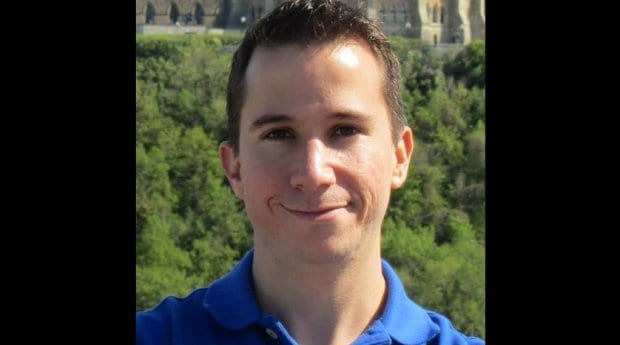Mauricio Olivares, Capital Pride’s former festival producer, is organizing Pride’s human rights vigil.
When Olivares resigned in May after a month on the job, he hinted at acrimony, saying that “[he] completely [disassociates himself] with the group, particularly with Tammy Dopson.”
Dopson, Capital Pride’s chair, has maintained that their relationship hasn’t had any setbacks.. Recently, Dopson told Daily Xtra that she reached out to Olivares to organize this year’s human rights vigil, something he had done last year as well.
In this edited interview, Olivares speaks exclusively to Daily Xtra about the vigil, working with Pride again and a sexual assault awareness campaign for the LGBT community.
Daily Xtra: According to Tammy Dopson, Capital Pride asked you to organize this year’s human rights vigil and you agreed. After leaving your post as festival producer, did you have any hesitation about working with Pride again?
Mauricio Olivares: Pride was born as a social justice movement and I think that many times people forget that today we are suffering from injustice and violence in Canada and in many parts of the world. The human rights vigil is a very important component of Pride, to help us to remember that we’ve lost people in the last year to violent crimes and that people still experience [homophobic and transphobic] harassment and rejection.
When Tammy and [festival producer] Joanne Hughes approached me, asking for help to launch this event, I did not hesitate because of the nature of the event. To me, the meaning of the event is more important than anything else. I’m doing this for the event and for the nature of the social movement.
What are your plans for the vigil?
We’re still confirming the speakers, but we’re going to have Gilbert Baker, the creator of the original rainbow flag. We’re also going to have Sophia Cassivi representing the trans community. I’m trying to get a third speaker, Kasha Jacqueline Nabagesera, who’s going to teleconference from Uganda. She’s a human rights activist in Africa and was the grand marshal for the New York City Pride parade this year. She’s been recognized by the United Nations and is a fantastic speaker to tell us about the persecution that is happening against our brothers and sisters in Africa.
All of this is in partnership with Amnesty International. The event will be held at the Human Rights Monument, but if there’s rain we’ll move inside to Ottawa City Hall.
When you resigned from Capital Pride, you didn’t discuss your reasons. Why did you resign as festival producer?
I think that’s water under the bridge. The reality is that I want to promote a spirit of celebration for Pride. The important thing is that Pride is an important event for so many people. It can be a life-changing event where people decide to come out and feel that they are not alone. To me, it’s not important to look into conflict or differences at this point.
What made you decide to launch a sexual violence awareness campaign?
People who are close to me from the community came forward and [disclosed] that they’d suffered sexual abuse after visiting bars or [meeting people] through online apps. They were concerned about not being able to reach out to the authorities, thinking that their careers could be affected. I brought the issue to the [Ottawa Police Service] GLBT liaison committee and from then on started meeting with other community leaders to talk about launching a campaign to inform the community about the risks of hooking up with strangers and what resources are available to people who have experienced sexual violence.
Why do you think sexual violence isn’t more openly discussed in the LGBT community?
I think there is a lot of stigma. The victim feels guilty when they suffer sexual abuse. I myself was a victim of sexual abuse when I was a child and I can tell you I know what it’s like to feel guilty about what happened to you. The victim often doesn’t reach out and lives alone with this burden. Socially, we have made it very difficult for the victim to access help. Having a public story of someone hooking up online might be seen as unprofessional or risky behaviour, so potentially people’s careers could be affected. People don’t want to reach out to authorities because they don’t want their personal information to be potentially made public.
What are the components of the campaign?
We decided to take a step back and consult the community before launching a campaign. [It was originally slated to take place during Pride] but Pride was too close and people were too busy, so we’re turning it into a one-day conference that’s going to happen in October, most likely on Oct 24. We’re going to invite community leaders from different organizations to assess what we can do and how we can launch this campaign appropriately.
Anything you’d like to add about the sexual violence awareness campaign or Pride?
The vigil is an important part of remembering our past, being mindful of our present and joining together to celebrate the human rights movement. I would love to see people come out to remember those who have been lost in the past year to violence and rejection across the world.
Ottawa Capital Pride’s Human Rights Vigil
Thursday, Aug 20, 2015, 8 pm.
Canadian Tribute to Human Rights Monument


 Why you can trust Xtra
Why you can trust Xtra


